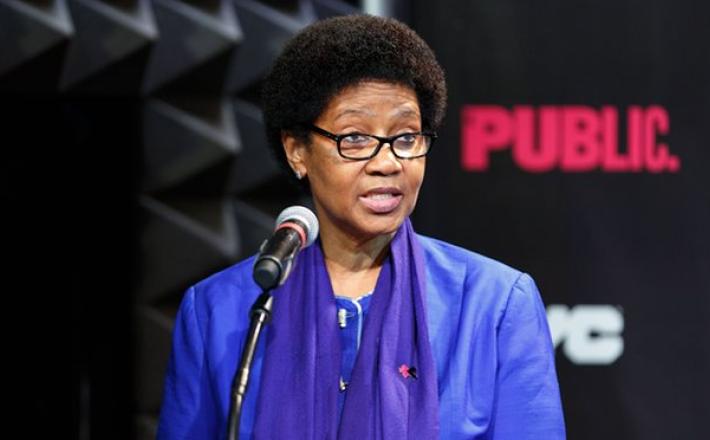UN Women's Executive Director vows to tackle laws blocking women's economic progress
The Guardian has published an article on the views of UN Women’s Executive Director about changing laws blocking women’s economic progress.
A global action plan to empower women economically by 2030 will focus on six areas, including addressing legislation that blocks women’s progress, the head of UN Women says.
But the plan has critics, with the head of Oxfam International claiming it risks producing only cosmetic improvements to women’s opportunities.
In a preview of the plan that a high-level panel will outline in September, UN Women’s executive director, Phumzile Mlambo-Ngcuka, said core areas to be addressed are digital and financial inclusion; childcare and unpaid care duties; pay equality; structuring the informal sector; entrepreneurship; legislation and international conventions.
“We are already engaging with governments around legislation that touches on women’s empowerment,” she said in an interview during the European Development Days conference last week. “One example is the convention on domestic work, which has only been ratified by 22 countries. If you are a domestic worker who needs leave to have a baby, someone else will walk in the door as soon as you go out, and you have no recourse.
“This is a worldwide concern, including in Europe where domestic work is often an entry point for migrant women who use their earnings to support their families and also send out remittances.”
The panel consists of 15 women and three men, and is co-chaired by Costa Rica’s president, Luis Guillermo Solís, and the CEO of Ikea Switzerland, Simona Scarpaleggia. Mlambo-Ngcuka said it will report in September and again in March, to “highlight interventions that countries, the private sector and different institutions can use to remove barriers to women’s economic empowerment”.
She said the panel wants more structure in the informal sector, which employs75% of women in developing regions who work outside the home, adding: “It is almost as though as soon as a sector gets populated by women, it gets degraded. We are looking for interventions that can put women into protected jobs in significant numbers.”
Mlambo-Ngcuka, a former deputy president of South Africa, said addressing women’s economic empowerment would have a positive impact on othersustainable development goals (SDGs), adopted by the UN general assembly in September. Goal five commits governments to achieve gender equality and empower women and girls.
Click here to read the full story.

The Guardian has published an article on the views of UN Women’s Executive Director about changing laws blocking women’s economic progress.
A global action plan to empower women economically by 2030 will focus on six areas, including addressing legislation that blocks women’s progress, the head of UN Women says.
But the plan has critics, with the head of Oxfam International claiming it risks producing only cosmetic improvements to women’s opportunities.
In a preview of the plan that a high-level panel will outline in September, UN Women’s executive director, Phumzile Mlambo-Ngcuka, said core areas to be addressed are digital and financial inclusion; childcare and unpaid care duties; pay equality; structuring the informal sector; entrepreneurship; legislation and international conventions.
“We are already engaging with governments around legislation that touches on women’s empowerment,” she said in an interview during the European Development Days conference last week. “One example is the convention on domestic work, which has only been ratified by 22 countries. If you are a domestic worker who needs leave to have a baby, someone else will walk in the door as soon as you go out, and you have no recourse.
“This is a worldwide concern, including in Europe where domestic work is often an entry point for migrant women who use their earnings to support their families and also send out remittances.”
The panel consists of 15 women and three men, and is co-chaired by Costa Rica’s president, Luis Guillermo Solís, and the CEO of Ikea Switzerland, Simona Scarpaleggia. Mlambo-Ngcuka said it will report in September and again in March, to “highlight interventions that countries, the private sector and different institutions can use to remove barriers to women’s economic empowerment”.
She said the panel wants more structure in the informal sector, which employs75% of women in developing regions who work outside the home, adding: “It is almost as though as soon as a sector gets populated by women, it gets degraded. We are looking for interventions that can put women into protected jobs in significant numbers.”
Mlambo-Ngcuka, a former deputy president of South Africa, said addressing women’s economic empowerment would have a positive impact on othersustainable development goals (SDGs), adopted by the UN general assembly in September. Goal five commits governments to achieve gender equality and empower women and girls.
Click here to read the full story.